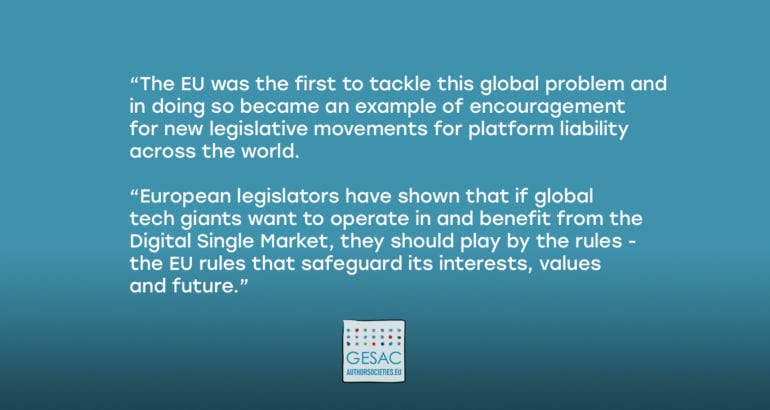Article 17 guidelines: our letter to Thierry Breton
Alongside GESAC’S submission to the Article 17 guidelines consultation, GESAC’s President and Vice-Presidents also sent a letter to Thierry Breton, the European Commissioner for Internal Market.
READ THE LETTER
The letter emphasises the critical nature of the Commission’s proposed guidelines on implementing Article 17 of the Copyright Directive and expresses our concerns that, in its current form, the guidelines could seriously jeopardise the original intentions of the Directive.

Dear Commissioner Breton,
GESAC groups 33 of the most important European authors’ societies and as such represents more than one million creators and rightsholders from all artistic fields (music, visual arts, audiovisual etc.). European authors’ societies are not-for-profit collective management organisations that allow protected works to be accessible to the public, while ensuring that their authors – the creators – are fairly remunerated for this usage. They are indispensable players in the digital market, enabling business models to develop and creativity and cultural diversity to flourish.
We are writing you to express our serious concerns regarding the consultation document undertaken by your services for the purpose of the Commission’s proposed Guidelines for Member States on the application of Article 17 of the Directive on Copyright in the Digital Single Market, which proposes several points that contradict the word and spirit of Article 17. If followed, this would change the careful balance that this hard-fought legislative instrument struck to the disadvantage of creators and rightsholders. We outlined those specific points in detail in our organisation’s answer to the consultation.
Nevertheless, we very much feel the urge to raise your attention to this issue at a political level, especially since Article 17 and the new Copyright Directive represent one of the biggest victories of the European Union’s democratic and independent decision-making process. It was achieved in the face of unprecedented pressure and intimidation conducted by tech giants against EU politicians and public opinion, often by means of their own mega platforms.
GESAC, as the largest creators’ organisation in Europe, has been at the forefront of these legislative efforts to establish copyright liability of online content sharing service providers (OCSSPs) like YouTube, Facebook and others and has followed the legislative negotiations very closely. Article 17 was carefully worded in an attempt to put an end to the pressures imposed by tech giants that use creative works as their business model but refuse to adequately remunerate creators. The provision improves the situation of creators vis-à-vis the OCSSPs that have been acting lawlessly and arbitrarily to the detriment of the cultural and creative sector.
The EU was the first to tackle this global problem and in doing so became an example of encouragement for new legislative movements for platform liability across the world. European legislators have shown that if global tech giants want to operate in and benefit from the Digital Single Market, they should play by the rules – the EU rules that safeguard its interests, values and future.
The creators community represented by GESAC relies on a robust framework to establish liability of OCSSPs, both within the forthcoming Guidelines of the European Commission and the national laws in Member States transposing the Directive. We urge the European Commission to remain faithful to the original intentions of the co-legislators when adopting Article 17, and ensure that the final Guidelines clearly underline the liability of OCSSPs to remunerate creators for the use of protected works and guarantees that they cannot escape from liability if they do not fulfil the requirements of Article 17.
Freedom of expression is the air that creators breathe in order to create. Ensuring the widest possible access to their creations is the only way they can generate enough revenue to earn a living. Authors’ societies are there to guarantee this dual perspective and provide the best solution for implementation. However, this guarantee could be put in serious jeopardy, risking the proper functioning of the market, if the Guidelines deviate from the purpose of Article 17 and weaken the protection it established for European creators against US tech giants.
We trust that your vision for the EU and understanding of the importance of cultural and creative sectors, both for the values and economic growth of our Union, will prevail and the final version of these critical Guidelines for creators will fulfil the legislation’s true intention.
We are at your disposal to discuss this in person as well and remain,
Yours sincerely,
Jean-Noël Tronc, CEO of SACEM, France, President of GESAC
Harald Heker, CEO of GEMA, Germany, Vice-President of GESAC
András Szinger, CEO of Artisjus, Hungary, Vice-President of GESAC
Victor Finn, CEO of IMRO, Ireland, Vice-President of GESAC